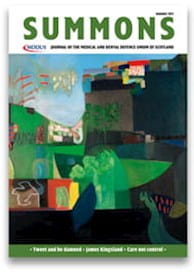I AM currently putting the finishing touches to a forthcoming book on consent. It has been a chance to return to basics and revisit familiar concepts. Consent is core material in ethics. It is unthinkable that anyone wouldn’t learn about the importance of consent during training. It is relevant to every clinical encounter. Yet, going back to ethical basics has been illuminating and thought-provoking, prompting the question ‘does familiarity breed consent’?
There are different ways in which familiarity might inform how consent is sought and obtained. First, there is familiarity with the process of consent itself. Healthcare is increasingly systematised and mechanisms are routinely in place to seek consent. Whatever the specialty, most practitioners have a way of seeking consent that is established and familiar. It might be that a GP uses a particular form of words to explain a referral. It might be that a dentist has leaflets that are dispensed to those requiring an implant. It might be that the physician carrying out endoscopies relies on the clinic nurse to explain the procedure and ensure that standard forms have been signed. It is easy to overlook the fact that what is merely another working day for the professional is likely to be a ‘red-letter’ day for the patient who may have had the appointment marked on their calendar for some time and made special arrangements to attend. A ‘routine appointment’ is rarely part of a patient’s routine.
Whatever the clinical setting, the wheels of efficient practice are oiled by established approaches to consent. However, sometimes one can become so familiar with a system that we become blind to its effects, both positive and negative. As we learn to depend on standard processes and formulaic encounters, we risk losing our critical and reflective perspectives. Whilst consent that is systematised may have many positive effects, it is only by stepping back and looking at ‘the way things are done’ with a fresh pair of eyes that we can know whether it is an effective system or where there might be room for development. When did you last think about the ways in which you seek consent? How do you know that your approach is effective?
The second way in which familiarity can shape consent is when a clinician gets to know patients over time. Again, a longstanding history of working with a patient can be an asset and contribute to trust and a strong therapeutic relationship. Many readers will, I am sure, be able to recall times when knowing an individual patient well has enhanced clinical care. Indeed, one of the oft-heard criticisms of recent healthcare reform is that continuity of care, both in the primary and secondary care settings, is increasingly rare to find. Yet, there can be other factors to consider when getting to know a patient over a long period of time. Familiarity can lead to shortcuts. It is easy to think that one knows a person sufficiently well to skip some of the niceties of seeking formal consent. After all, if someone has had the same procedure or treatment over a period of time, they do have experience that a ‘novice’ patient does not share. However, consent should be an ongoing process and merely because someone agreed to a procedure in the past, it cannot be assumed that he or she will do so again. Consent is about clinician and patient sharing their perspectives and experiences, without unduly privileging expert knowledge. The feeling that one already knows the patient’s priorities may compromise both seeking consent and the consultation.
Many clinicians will have experienced the frustrations of shifting roles and becoming patients themselves. It is wellknown that when a doctor seeks medical advice and treatment, he or she is likely to find that the consultation is influenced by assumptions about pre-existing knowledge, professional status and personal expectations. A diluted version of that phenomenon can occur when seeing patients whom one knows well. It can be all too easy to assume and anticipate, rather than to ask and explore. Whilst the interaction between a clinician and a longstanding patient will naturally evolve over time, there should be time to be thorough and to return to the fundamentals of consent. Is the patient sufficiently informed? Have things changed over time and if so, how? How does what has gone before inform and shape current and future treatment? Is the patient still finding treatment helpful? Are there new symptoms or side-effects to be discussed? What is the patient feeling six months, a year or five years down the line?
Does familiarity breed consent? Perhaps, but it may be a partial, sub-optimal version of a process that is essential to ethical practice. Might it be time to look anew at the familiar in your clinical practice?
Deborah Bowman is a senior lecturer in medical ethics and law at St George’s, University of London
This page was correct at the time of publication. Any guidance is intended as general guidance for members only. If you are a member and need specific advice relating to your own circumstances, please contact one of our advisers.
Read more from this issue of Insight

Save this article
Save this article to a list of favourite articles which members can access in their account.
Save to library